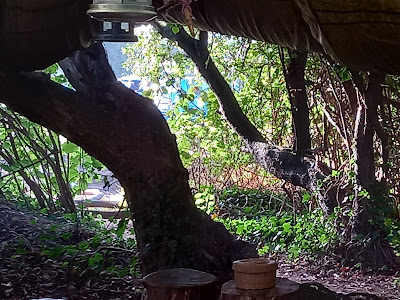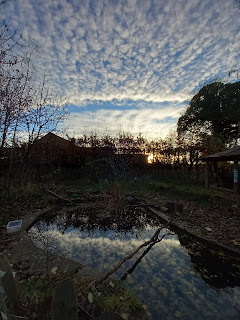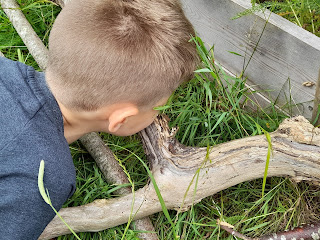Learning Skills
This week it was the weather that was up and down. It's generally mild for Autumn across most of the UK, but two days saw a tiny sparkle of frost and the temperatures start off really low, while most afternoons I've needed the car window open to drive home!
I'm happy to deal with whatever the weather throws at us, and slowly the children have got used to that. 'Wet Play' as school is a strange thing as the children sit it out in class because of the rain only to come out to Forest School after playtime! This is on the larger agenda for the school to manage, but meanwhile, come rain or shine the classes head out to basecamp smiling.
The rain that filled the dig pit last week creating a good-sized pond had sunk into the soil and was pure mud! It led to discoveries when bird footprints and cat paw-prints were making patterns across the surface. Using the mud to create a "it's purely decorative" bridge, building an obstacle course around the area, and forming a step where the area has been dug the deepest.
The parachute was damp every morning and when the sun came out the children liked to watch the evaporation as the canopy steamed. This opened discussions about kettles, the evening bath, what is smoke vs. what is steam, and how clouds are formed.
Some of KS2 decided to create a house - not a den - and used pallets to make a table, sofa, and a bed - they made a lunch of sushi wraps for all! Following classes made it a hotel and then a cafe. The combinations of children this attracted were very varid. Outdoors the friendship groups and peer combinations form based on the activity the children choose to do, and this mixes up established groups all the time. The draw of building a table with a few people you wouldn't usually play with is too great, the task becomes populated by those interested in it, and then they communicate to improve it and often create something amazing! They were proud enough of their achievement that they asked to leave to walk back to class via the area so those who hadn't been part of the construction could be shown what they had created.
There is always intermittent tree climbing, bug hunting, bird spotting etc. The children dip and out of these activities at will.
At the end of the (four day) week a group decided to build a bunker in the dig pit. A random group worked together to start off the hole to hide in, and layered it with cut grass and hessian to make it 'comfortable'.
When the idea of a roof came about there were a couple of design ideas...
Before there was consesus on the best way to shelter AND camouflage!
Three children worked on it for a solid 40 minutes while others dipped in and out of the activity, giving ideas and suggesting solutions to issues that arose. At then end of it they requested that we leave it for Year 1 to play in this afternoon. Because of this they tested its safety and set some rules for the younger group to follow: only 2 children in there at once and absolutely no climbing on top!
Year 1 loved it and followed the rules. As the real fun had been in the building of it, once those who wanted to try out wriggling inside had done so, they pretty much abandoned it and found other things to occupy them!
I rarely have any kind of full-on focus during a session, I feel it restricts what the children learn. We have explored imaginative development, language development, social development, physical development, creative development, and cognitive development across 4 days.
The children have experienced maths, physics, art, geography, PE, English, and science. They've been engineers, creators, helpers, problem solvers, communicators, climbers, organisers, observers, and active participants.
They've demonstrated independence, responsibility, self-esteem, confidence, kindness, caring, innovation, friendship, motivation, curiosity, persistence, achievement, thoughtfulness, risk assessment, critical thinking, and teamwork.
They've argued, discussed, resolved, assisted, devised, collaborated, cooperated, smiled and laughed.
I have no data to prove the skills they are developing. What one class experienced this week may not be what another class focused on. What one child or group learned will not be the same as their peers. Across this Term all children have had the opportunity to explore these things, as they will across all 6 terms of the year. By allowing all year groups to participate in sessions by the end of their school life in Primary there will be little each child doesn't explore.
And as they go, their developing learning skills, and their attitude to school grows more positive.














Comments
Post a Comment